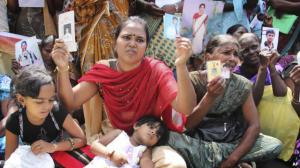Impending UN Human Rights Chief’s Sri Lanka Report : Comparing North Korea & Sudan recommendations for mass atrocities
An Event at the UN Human Rights Council in Geneva
GENEVA, SWITZERLAND, June 16, 2015 /EINPresswire.com/ --When: Tuesday, June 16
Time: 15h00
Where: Room XXVI, UNOG, Palais des Nations
A side event at the UN Human Rights Council organized by:
• Association Ibn Sina, with partnership of Collectif la Paix au Sri Lanka (ICCPG) and
• Transnational Government of Tamil Eelam (TGTE)
Moderator: Hon. Manickavasagar, Minister of International Affairs, TGTE.
Speakers:
1) Hon. Geoffrey Robertson QC, human rights barrister, academic & author: UK.
2) Hon. Piquois Gilles, Human Right Lawyer, France.
3) Prof. Ramu Manivannan, Madras University, India.
• Whether Change of Head of State [part of the old regime] constitutes fundamental and durable change in the domestic environment?
• Can a state accused of genocide deliver justice?
• From Sovereign Impunity to International Accountability.
• International Justice v Realpolitik.
1) The Potential Culpability of the New President Sirisena will not be Conducive for a Domestic or Hybrid Mechanism: President Sirisena served as the acting Defense Minister during the period at the end of the war, when large numbers of Tamils were killed.
“Sirisena is hardly a beacon of hope for the Tamils: he was acting as defense minister in the nightmarish final fortnight of the war.” – Economist, January 3rd, 2015.
2) The Change of Guard in Sri Lanka will not result in a Change of the Institutionalized Impunity:
Even though the President has been changed, the political environment vis-à-vis Tamils, has not changed: Several former military personal, including the military commander at the end of the war General Sarath Fonseka, are in senior positions in the current government.
The fact that the military apparatus is still intact and the militarization of the NorthEast continues perpetuates fear among the Tamils, and has a deep impact on day to day activities there. Therefore, it is unlikely that victims/witnesses will be truly independent before a domestic or hybrid tribunal.
• Please sign: A Million Signature Campaign to "Refer Sri Lanka to International Criminal Court" at: www.tgte-icc.org
Panel Discussion will be followed by a Q&A Session. Light Tamil food and refreshments will be served.
Contact: +33-6- 2349- 1406
ABOUT TRANSNATIONAL GOVERNMENT OF TAMIL EELAM (TGTE):
Transnational Government of Tamil Eelam (TGTE) is a democratically elected Government of a million strong Tamils (from the island of Sri Lanka) living in several countries.
TGTE held internationally supervised elections among Tamils around the world to elect 132 Members of Parliament. It has a bicameral legislature and a Cabinet. It held one of its Parliamentary sittings in the British Parliament.
TGTE is leading a campaign to realize Tamils’ political aspirations through peaceful, democratic and diplomatic means. The Constitution of the TGTE mandates that it should realize its political objective only through peaceful means.
The Prime Minister of TGTE is Mr. Visuvanathan Rudrakumaran, a New York based lawyer.
* TGTE was formed after the mass killing of Tamils by the Sri Lankan Government in 2009. According to UN internal review report on Sri Lanka, over 70,000 Tamils were killed in five months in early 2009 and Tamil women were sexually assaulted and raped by Sri Lankan Security forces. There are over 90,000 Tamil war widows and thousands of Tamils disappeared due the conflict.
BACKGROUND:
Tamils have faced repeated mass killings since 1958 and the mass killings in 2009 prompted UN Secretary General Ban Ki-moon to appoint a Panel of Experts to report on the scale of killings.
According to the report by this UN Panel, tens of thousands of Tamil civilians were killed and women were sexually abused and raped by the Sri Lankan Security Forces.
According to this UN Panel, the killings and other abuses that took place amount to war crimes and crimes against humanity. Independent experts believe that there are elements of these abuses that constitute an act of genocide.
According to the UN internal review report on Sri Lanka, over 70,000 Tamils were killed in five months in early 2009. There are over 90,000 Tamil war widows and thousands of Tamil political prisoners in Sri Lanka.
Members of the Sri Lankan security forces are almost exclusively from the Sinhalese community and the victims are all from the Tamil community.
A Buddhist Monk shot and killed a Sri Lankan Prime Minister 1959 for having talks with Tamil political leaders to find a solution to the ethnic conflict.
Tamils overwhelmingly voted in a Parliamentary election in 1977 to establish an independent and sovereign country called Tamil Eelam. This Parliamentary election was conducted by the Sri Lankan Government.
Transnational Government of Tamil Eelam
TGTE
+33-6- 2349- 1406
email us here
Legal Disclaimer:
EIN Presswire provides this news content "as is" without warranty of any kind. We do not accept any responsibility or liability for the accuracy, content, images, videos, licenses, completeness, legality, or reliability of the information contained in this article. If you have any complaints or copyright issues related to this article, kindly contact the author above.

